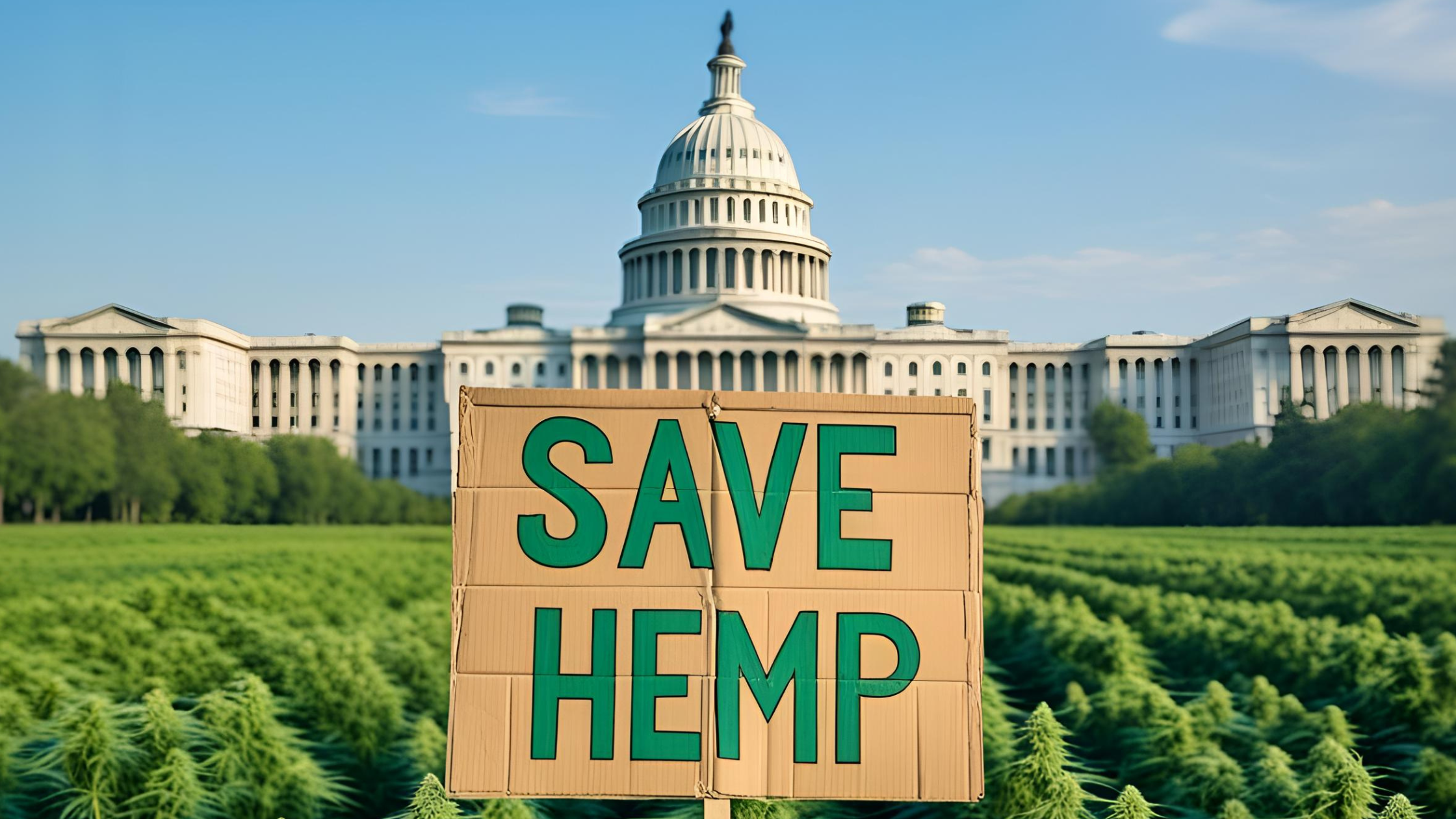
Congress Is Quietly Trying to Kill Hemp—Here's How to Stop It
The hemp industry is under attack, and most people don't even know it's happening. Buried deep within the FY2026 Agriculture Appropriations Bill are provisions that could eliminate the legal hemp market as we know it—not through an outright ban, but through a backdoor redefinition that would make most hemp products illegal overnight.
This isn't about removing dangerous substances from the market. It's about corporate interests trying to eliminate competition. The hemp industry supports over 75,000 jobs and generates billions in economic activity, yet a small group of legislators is attempting to dismantle it through legislative sleight of hand.
If you use hemp products, work in the hemp industry, or simply believe in free market principles, you need to understand what's happening right now—and what you can do to stop it.
The Stealth Attack Hidden in Agricultural Legislation
The FY2026 Agriculture Appropriations Bill, primarily drafted by Rep. Andy Harris, contains language that fundamentally changes how hemp is defined under federal law. These changes aren't being debated openly or receiving media attention. Instead, they're being quietly inserted into must-pass legislation where they can slip through without public scrutiny.
Here's what the bill proposes:
A Complete Redefinition of Hemp
Currently, hemp is defined as cannabis containing less than 0.3% Delta-9 THC. The new definition would include ALL THC isomers—Delta-8, Delta-10, THCA, and any other THC-like compounds. This seemingly small change would instantly make thousands of legal hemp products illegal.
Synthetic Compound Prohibitions
The bill would ban any synthetic or non-plant-derived cannabinoids, even if they contain less than 0.3% THC. This affects many processing methods used to create consistent, safe hemp products.
Zero Tolerance for THC-Like Compounds
Perhaps most concerning, the legislation would prohibit any "quantifiable amount" of THC-like compounds. This creates an impossible standard—even trace amounts that occur naturally in hemp plants would make products illegal.
Enforcement Power Transfer
The bill transfers enforcement authority from the USDA to the U.S. Department of Health and Human Services. This shift removes agricultural expertise from hemp regulation and places it under bureaucrats with no understanding of farming or hemp cultivation.
The Protected Products—And What's Left Behind
The legislation does include protections, but only for specific hemp uses: fiber, grain, oilseeds, and research. These carve-outs reveal the true intent of the bill. Traditional agricultural hemp products that don't compete with other industries are protected, while cannabinoid-based wellness products—the fastest-growing segment of the hemp market—are targeted for elimination.
This selective protection isn't about safety or public health. If it were, all hemp products would be evaluated using the same safety standards. Instead, it's about eliminating specific market segments that threaten established interests.
Why This Matters More Than You Think
The hemp industry has become a vital part of America's agricultural economy. Small farmers who struggled with traditional crops found new opportunities in hemp cultivation. Rural communities gained economic stability. Consumers gained access to natural wellness products that help with everything from sleep issues to chronic pain management.
But the industry's rapid growth has created enemies. Large marijuana corporations see hemp as competition for their tightly controlled markets. Pharmaceutical companies don't want consumers choosing natural alternatives. Some legislators view any cannabis-related product as inherently dangerous, regardless of scientific evidence.
Economic Impact
If this legislation passes, thousands of small businesses would close overnight. Farmers would lose their hemp crops. Manufacturing facilities would shut down. The economic ripple effects would devastate rural communities that have invested heavily in hemp infrastructure.
Consumer Impact
People who rely on hemp products for wellness would lose access to safe, legal alternatives. Many would be forced toward unregulated black market products or expensive pharmaceutical alternatives. Others would simply go without relief for their health conditions.
Innovation Consequences
The hemp industry has driven significant innovation in extraction methods, product development, and quality testing. Eliminating the cannabinoid market would halt this progress and send researchers and entrepreneurs to other countries with more supportive regulatory environments.
The Corporate Interests Behind the Push
Understanding who benefits from hemp prohibition reveals the true motivations behind this legislation. Large marijuana companies operate under complex state licensing systems that limit competition and protect their market share. Hemp's legal status under federal law allows smaller companies to compete without navigating expensive state licensing processes.
Many of these same marijuana corporations have:
-
Repeatedly failed safety inspections
-
Violated state regulations
-
Been caught using illegal pesticides
-
Exploited immigration laws for cheap labor
Meanwhile, hemp companies operate under federal oversight with accredited testing labs and transparent supply chains. The safety record of legal hemp products is exemplary, yet they're being targeted while problematic marijuana operations continue receiving protection.
The Timeline and the Trap
This isn't the first attempt to eliminate hemp through backdoor legislation. Similar language was attempted in 2024 but was caught and removed before passage. The current effort is more sophisticated and better hidden within essential government funding legislation.
The FY2026 Agriculture Appropriations Bill language has already passed both House and Senate subcommittees. The next step is incorporation into a Continuing Resolution—a must-pass bill that keeps the government funded. These votes typically happen quickly with little debate, making it the perfect vehicle for controversial provisions that couldn't pass on their own merits.
We have approximately 60 days before this language could become law. Once it's in a Continuing Resolution, stopping it becomes exponentially more difficult. No legislator wants to be blamed for shutting down the government over hemp policy.
How Hemp Testing Actually Works
One of the most misleading aspects of the anti-hemp campaign is the suggestion that hemp products are unsafe or inadequately tested. The reality is exactly the opposite. Hemp testing labs must be federally accredited and follow strict protocols. They test for:
-
Cannabinoid content and potency
-
Pesticide residues
-
Heavy metals
-
Microbial contamination
-
Residual solvents
These labs are independent from the companies they test, unlike many marijuana testing facilities that are often owned by the same corporations they're supposed to regulate. The hemp industry has embraced transparency and rigorous testing standards because it benefits everyone—producers, retailers, and consumers.
What You Can Do Right Now
The hemp industry can't fight this battle alone. It needs consumers, farmers, small business owners, and anyone who believes in free market principles to take action. Here's how you can help:
Contact Your Representatives
Call or email your senators and representatives. Tell them you oppose the hemp-related provisions in the FY2026 Agriculture Appropriations Bill. Be specific about how these changes would affect you personally—whether as a consumer, employee, or business owner.
Support Advocacy Organizations
Organizations like the American Healthy Alternatives Association (OHAA) are working full-time to fight these legislative attacks. They need funding for lobbying efforts, legal challenges, and public education campaigns.
Share Information
Most people don't know this legislation exists. Share this article, post on social media, and talk to friends and family about what's happening. The more people who understand the issue, the harder it becomes for legislators to pass it quietly.
Support Hemp Businesses
Economic pressure works. Support hemp businesses in your area. Buy hemp products. Show legislators that this is a thriving industry with real economic impact and consumer demand.
The Bigger Picture: Free Markets vs. Crony Capitalism
This fight isn't really about hemp—it's about whether America will maintain free markets or allow established corporations to use government regulation to eliminate competition. The hemp industry represents everything that's good about American entrepreneurship: innovation, small business opportunity, and consumer choice.
The forces trying to eliminate hemp represent crony capitalism at its worst: using government power to protect market share rather than competing on quality and price. If they succeed with hemp, they'll use the same tactics against other industries.
Time to Take a Stand
The hemp industry has proven that it can operate safely, transparently, and profitably under appropriate regulation. It has created jobs, generated tax revenue, and provided consumers with natural wellness alternatives. It doesn't deserve to be eliminated through legislative trickery.
The fight for hemp is a fight for basic fairness in how our laws are made. It's a fight for small businesses against corporate monopolies. It's a fight for consumer choice against paternalistic government control.
You have the power to influence this outcome. Your voice matters. Your representatives need to hear from you. The hemp industry needs your support.
Don't let Congress quietly kill an entire industry. Take action today, because tomorrow might be too late.
Visit the American Healthy Alternatives Association website to learn more about current advocacy efforts and find tools to contact your representatives. The hemp industry is counting on you.




